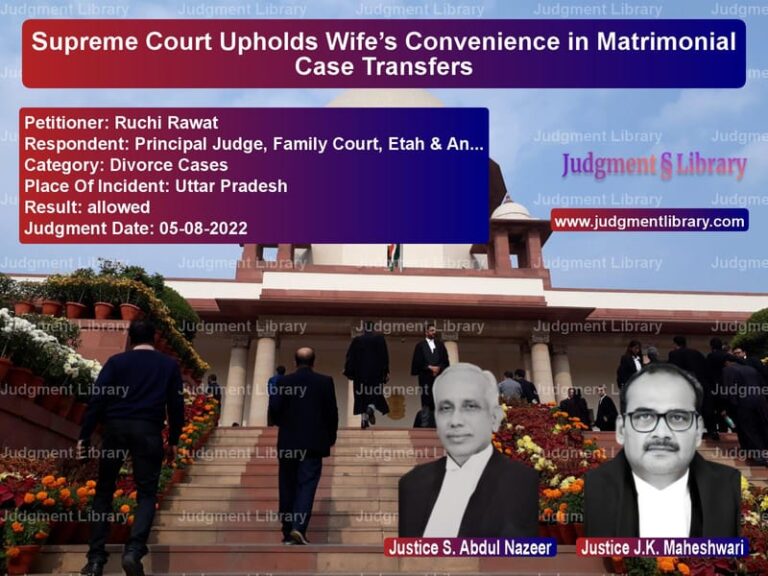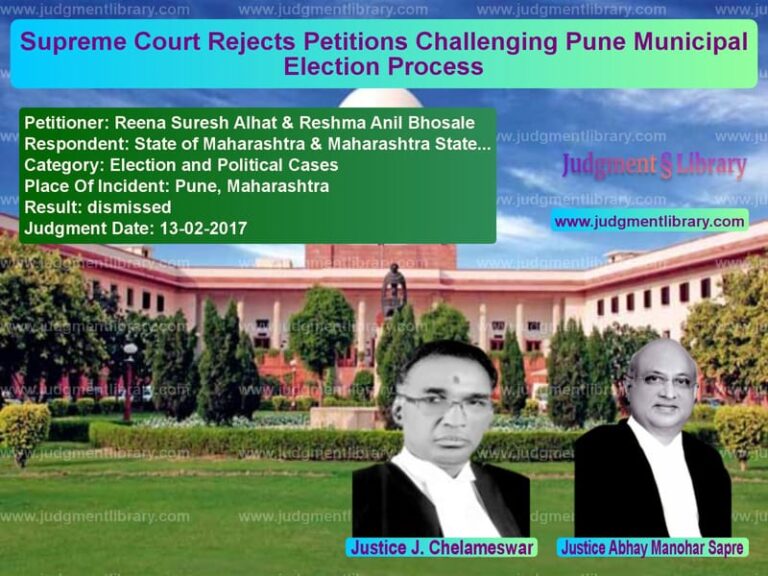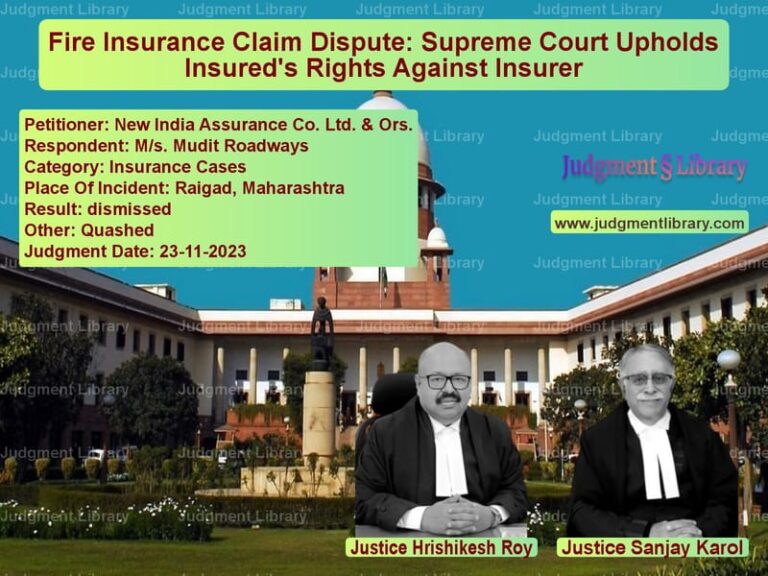Rebate Claim under Central Excise: Supreme Court Clarifies Time Limit Applicability
The case of Sansera Engineering Limited vs. Deputy Commissioner, Large Tax Payer Unit, Bengaluru revolves around the issue of whether the time limitation prescribed under Section 11B of the Central Excise Act, 1944 applies to rebate claims under Rule 18 of the Central Excise Rules, 2002. The Supreme Court addressed the appellant’s challenge to the rejection of their rebate claims for excise duty paid on exported goods.
Background of the Case
The appellant, M/s Sansera Engineering Limited, a manufacturer of excisable goods, exported goods between August 2015 and March 2016. They subsequently filed rebate claims for excise duty paid on the exports:
- Claims filed on 10.02.2017 for exports made between August 2015 and October 2015.
- Claims filed on 14.02.2017 for exports made between October 2015 and March 2016.
The rebate claims amounted to Rs. 29,47,996/-, Rs. 42,27,928/-, and Rs. 1,47,27,766/- respectively. However, the claims were rejected by the authorities on the ground that they were filed beyond the prescribed one-year limitation under Section 11B of the Central Excise Act.
Key Legal Issues
The core issue in this case was:
- Whether the time limit under Section 11B of the Central Excise Act applies to rebate claims under Rule 18 of the Central Excise Rules.
- Whether Rule 18 is a standalone provision and does not attract the limitations prescribed under Section 11B.
- Whether amendments made to the rebate notification in 2016 retroactively impact rebate claims filed for exports prior to the amendment.
Arguments by the Petitioner (Sansera Engineering Limited)
The appellant presented the following arguments:
- The rebate of excise duty under Rule 18 is distinct from a refund claim under Section 11B.
- Rule 18 and Notification No. 19/2004, which governed rebate claims, did not explicitly refer to Section 11B of the Central Excise Act before the 2016 amendment.
- Since the relevant rebate notification did not incorporate Section 11B, the rebate claim should not be restricted by its limitation period.
- The 2016 amendment explicitly inserting a reference to Section 11B in the notification should not apply retrospectively.
- The rebate of excise duty on exported goods serves as an incentive, and technical barriers such as the limitation period should not prevent genuine exporters from claiming their rightful rebate.
Arguments by the Respondent (Tax Authorities)
The tax authorities countered the appellant’s arguments with the following points:
- The claim for rebate of duty is covered under the broader framework of refunds under Section 11B.
- Explanation (A) to Section 11B clearly defines “refund” to include “rebate of duty.”
- The one-year time limit under Section 11B applies to all refund-related claims, including rebates.
- There is no reason why rebate claims should be exempt from the statutory limitation period when refunds in general are subject to it.
- The Supreme Court has previously ruled that subordinate legislation (like rebate notifications) cannot override the provisions of a parent statute.
Supreme Court’s Ruling
The Supreme Court upheld the rejection of the rebate claims, ruling that:
“Section 11B of the Act shall be applicable with respect to claim for rebate of duty also. As per Explanation (A) to Section 11B, ‘refund’ includes ‘rebate of duty’ of excise.”
The Court reasoned:
- The limitation under Section 11B is applicable to all rebate claims since the rebate of duty is included in the definition of refunds under the Act.
- Even though Rule 18 does not expressly refer to Section 11B, a subordinate rule cannot override a parent statute.
- There was no basis to argue that the rebate claims before 2016 should be exempt from the limitation period, as Section 11B always governed such claims.
- “The parent statute must prevail over subordinate legislation.”
Key Takeaways from the Judgment
- The Supreme Court reinforced that all rebate claims under Rule 18 must comply with Section 11B’s time limitation.
- Exporters must ensure timely submission of rebate claims, as procedural requirements cannot be overlooked.
- The ruling clarifies that a rebate of excise duty is not a separate entity from a refund and falls within the statutory framework of Section 11B.
Conclusion
The Supreme Court’s decision sets a clear precedent that rebate claims under Rule 18 of the Central Excise Rules are subject to the one-year limitation period under Section 11B of the Central Excise Act. Exporters must file rebate claims within this prescribed timeframe to avoid rejection. This ruling highlights the importance of adhering to procedural compliance in taxation matters.
Petitioner Name: Sansera Engineering Limited.Respondent Name: Deputy Commissioner, Large Tax Payer Unit, Bengaluru.Judgment By: Justice M.R. Shah, Justice M.M. Sundresh.Place Of Incident: Bengaluru.Judgment Date: 28-11-2022.
Don’t miss out on the full details! Download the complete judgment in PDF format below and gain valuable insights instantly!
Download Judgment: sansera-engineering-vs-deputy-commissioner,-supreme-court-of-india-judgment-dated-28-11-2022.pdf
Directly Download Judgment: Directly download this Judgment
See all petitions in Income Tax Disputes
See all petitions in Tax Refund Disputes
See all petitions in Customs and Excise
See all petitions in Judgment by Mukeshkumar Rasikbhai Shah
See all petitions in Judgment by M.M. Sundresh
See all petitions in dismissed
See all petitions in supreme court of India judgments November 2022
See all petitions in 2022 judgments
See all posts in Taxation and Financial Cases Category
See all allowed petitions in Taxation and Financial Cases Category
See all Dismissed petitions in Taxation and Financial Cases Category
See all partially allowed petitions in Taxation and Financial Cases Category







